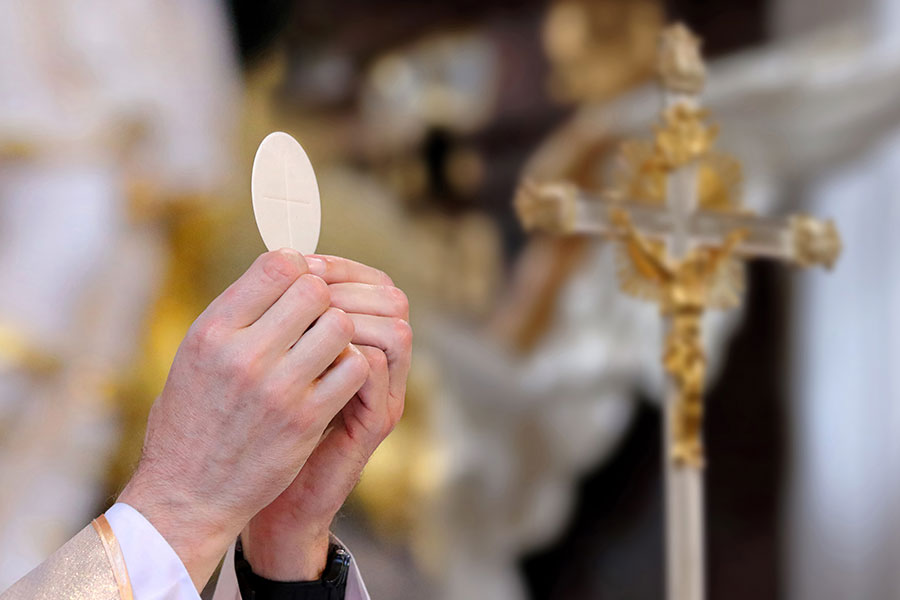The success of the National Eucharistic Revival depends on each one of us

A year and a half after the U.S Conference of Catholic Bishops voted to proceed with a National Eucharistic Revival, this weekend — the feast of Corpus Christi, observed — marks the official launch.
Proposed to address the dispiriting results of a Pew Research study that found that even a significant number of Catholics in the United States who attend Mass once a week or more do not believe that Christ is truly present — body, blood, soul and divinity — in the Blessed Sacrament, the National Eucharistic Revival is a three-year journey culminating in a National Eucharistic Congress in Indianapolis in July 2024.
That congress, the bishops hope, will become a regular event in the life of the church in the United States, fueling the fire of faith in the Eucharist into the future.
Yet, while it's human nature to focus on the big event, there's much more to this revival than the gathering of 80,000 or so Catholics in Indianapolis two years from now.
The first year of the revival is focused on diocesan efforts to help Catholics encounter the reality of Christ truly present in the Eucharist they receive at every Mass — and which is reserved in the tabernacle of every Catholic church 364 days a year.
Across the country this weekend, many dioceses have organized eucharistic processions in which scores of thousands of Catholics are projected to take part. In Our Sunday Visitor's home diocese of Fort Wayne-South Bend, Indiana, for example, 5,000 Catholics are expected to gather in Warsaw, Indiana, to follow our Lord on a 2.8-mile pilgrimage from Sacred Heart Church to Our Lady of Guadalupe and to take part in a Corpus Christi festival afterward.
Perhaps more than the National Eucharistic Congress, these eucharistic processions are a good metaphor for the revival itself. While the planning of such diocesan-wide processions always begins with the invitation of the local bishop, their execution depends on the desire of lay Catholics to take part in a unique encounter with our Lord.
Not everyone will be able to walk the entire 2.8-mile route here in the Diocese of Fort Wayne-South Bend, but the desire to give up a good portion of a Sunday in mid-June (Father's Day, no less) to follow our Lord even a short distance says more than the number of Catholics who ultimately arrive at the festival.
People don't make such sacrifices for a mere symbol; they may, however, make them for a person.
The bishops have named Blessed Carlo Acutis as the patron of this first year of the National Eucharistic Revival, and in his life, we see the joy that an encounter with Christ in the Eucharist can bring.
Given the number of Catholics who told Pew Research that they regard the Eucharist as a mere symbol, however, perhaps the Catholic novelist and short-story writer Flannery O'Connor might be a worthy secondary patron.
When the novelist Mary McCarthy, herself raised Catholic, said that, as she had matured, she had come to regard the Eucharist as a symbol and "a pretty good one" at that, O'Connor replied, "in a very shaky voice, 'Well, if it's a symbol, to hell with it.'''
Most who recount this story end it there, but O'Connor went on to describe how she initially felt that her response to McCarthy was inadequate but had come to understand otherwise: "That was all the defense I was capable of but I realize now that this is all I will ever be able to say about (the Eucharist), outside of a story, except that it is the center of existence for me; all the rest of life is expendable."
How many of us — even if we believe with our whole heart and mind that Christ is truly present, body, blood, soul and divinity, in the Blessed Sacrament — can say with O'Connor that the Eucharist "is the center of existence for me; all the rest of life is expendable?"
Would our children, our fellow parishioners, our co-workers, our friends say that this is true of us? How many of us, even as we've understood how essential the National Eucharistic Revival will be to the future of the Catholic Church in the United States, have regarded it as something that others need more than we do?
The reality of our encounter with the person of Christ in the Eucharist is that we can, and should, and must always go deeper — for our own sake, and for the sake of our families, our fellow parishioners, our co-workers, our friends. Because, in the end, the success of the National Eucharistic Revival depends not on the bishops but on each one of us.
The more deeply we encounter Christ in the Eucharist, the more our lives will reflect that encounter. When Christ in the Eucharist is the center of our existence, those around us will know — and they will come to understand that the Eucharist is no mere symbol but a person whom they, too, will desire to encounter more deeply.
By Our Sunday Visitor, Catholic News Service
